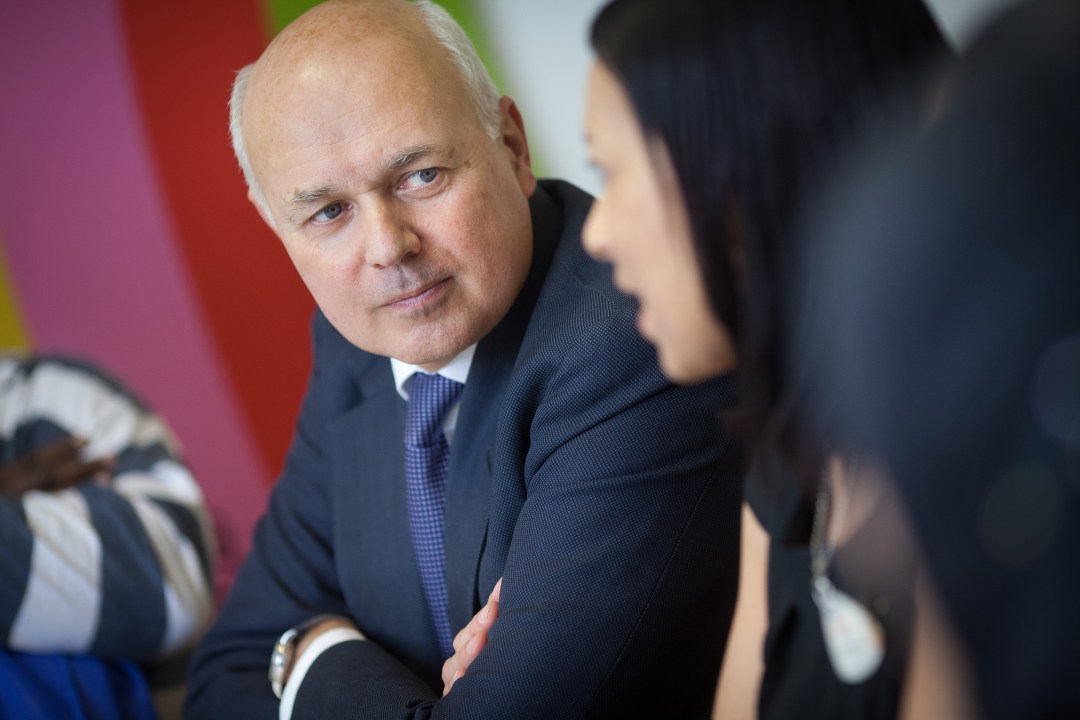Welfare wars are erupting again, with Iain Duncan Smith’s bill amended in the
Lords and more showdowns ahead. Number 10 has been completely robust, threatening to use rarely-invoked powers to overrule the Lords. In my Telegraph column today, I say why it’s so important that David Cameron
does not go wobbly – as his predecessors did.
Tony Blair understood the need for radical welfare reform, especially when his idol Bill Clinton introduced it in America. Listening to his speeches in the mid-90s is heartbreaking: he had
precisely the right idea, but lacked the determination to implement it. Frank Field was asked to ‘think the unthinkable’, but when disabled protesters chained themselves to the gates of
Downing Street, the Prime Minister gave up. Welfare reform means you stand accused of hurting the most vulnerable people in society – Clinton was warned he’d make New York into
‘Calcutta on the Hudson’. And as we’re dealing with millions of people’s lives, mistakes are made. This is why welfare reform is the toughest mission that any politician can
undertake.
In the Lords, we’re hearing those protests: why balance the books on the backs of the poorest people in society? But to me, the question is how anyone can refer to the UK’s unreformed
welfare state as compassionate, given that it is probably the number one cause of poverty in this country. Normally, ministers have to sort out welfare: if they don’t increase the supply of
workers (that is, turn dole claimants into jobseekers) they won’t grow the economy. But then along came mass immigration, brining a new industrious breed of workers who put in long hours,
paid tax and provided a Third Way. As Gordon Brown worked out, immigration means you can grow the economy – and avoid grasping the nettle of welfare reform. This was the policy Labour
adopted.
Even now Cameron could, if he wanted, ignore welfare bill. It is forecast to stay at around 11 per cent of GDP, so it’s manageable. And these industrious immigrants are still coming, ready to
grow the economy. Since the election, nine tenths of the employment rise amongst the working-age population has been accounted for by foreign-born workers.

The proportion in Glasgow, Liverpool and Blackpool on out-of-work benefits is over 20 per cent right now – an appalling figure. But what makes it much, much worse is that this was true
throughout the boom years. While all these cities were importing immigrants, at least a fifth of the working-age population was claiming out-of-work benefits. The welfare state had broken the
connection between British economic growth and British dole queues: it had become the primary sponsor of what Beveridge referred to as the ‘giant evil’ of idleness. You can bet
he’d be appalled to see the way his social insurance scheme started to incubate the very evil it was designed to eradicate.
The waste of money is bad enough, but the waste of human potential is heartbreaking. This failure created welfare ghettoes, the modern-day equivalent of Blake’s dark, satanic mills. They are
our national shame, and still under-examined. We have somehow managed to grow a massive degree of social segregation in Britain where the lives of the millions who live in welfare ghettoes are
pretty much a mystery to those who live in well-to-do parts. The crime figures, education, drug abuse, hospitalisation, life expectancy – all show what has become, in effect, a country within
a country.
Cameron, Osborne and IDS are not out to save money: this mission is about saving lives. Everyone who has attempted welfare reform has been accused of being cruel and heartless, and many have either
shelved or diluted their proposals because the accusation is so potent. But Britain simply has too much at stake. The poverty we’re nurturing has been ignored for too long.
UPDATE: The topic of immigration gets people very excited – and my mentioning that nine-tenths of the rise in employment is accounted for by foreign-born workers is portrayed, by
excitable types, as proof that I’m a Little Englander against immigration. To the chagrin of many CoffeeHousers, I am pro-immigrant and believe our country is richer – economically,
culturally and socially – as a result. I think it’s a net positive, and the chart above is testimony to the industry of an immigrant class that Britain is lucky to have. Most of us don’t have
to go too far back in our family tree to find immigrant blood.
But I also think that supporters of immigration, like myself, should acknowledge there are downsides – felt by those who compete with immigrants for jobs, school places, council houses etc.
In the above blog, my point is that immigration has allowed ministers not to worry to much about fixing welfare. Had it not been for immigration of the last 12 years, Labour would have been forced
to fix welfare because the economy would not have grown otherwise. I see mass immigration as the result of welfare failures. The welfare trap created a vacuum in our economy, which sucked in
millions of hard-working Poles, Czechs etc. Globalisation means that people start relationships between countries: Ryanair wedding bells can be heard all over Britain. Including, I should add, over
the Inverness church where I married five years ago. Immigration was perhaps the biggest single change to Britain over the last decade. Perhaps someday soon we’ll be able to talk about it
seriously.








Comments